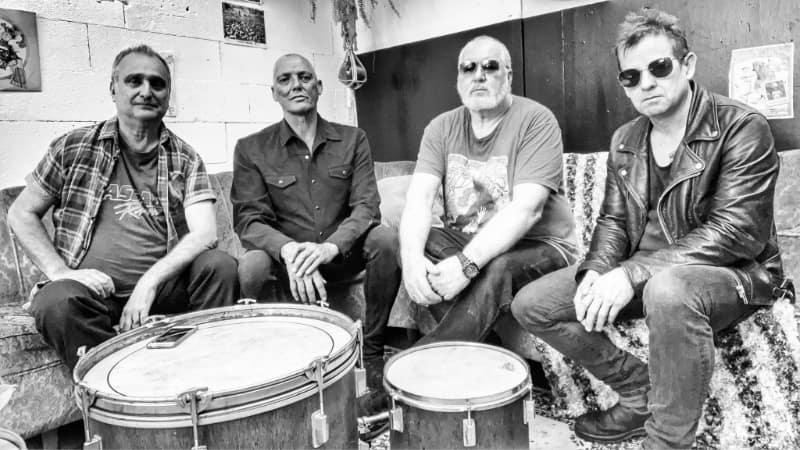 Van Ruin (the band) are bassist Pete Trifunovic (Mushroom Planet and Sonic Garage), Phil Van Rooyen, guitarist Al Creed and drummer Stu Wilson preparing for their live debut this weekend past.
Van Ruin (the band) are bassist Pete Trifunovic (Mushroom Planet and Sonic Garage), Phil Van Rooyen, guitarist Al Creed and drummer Stu Wilson preparing for their live debut this weekend past.
Van Ruin is, I suppose, the Australian way of pronouncing Phil Van Rooyen's surname. Perhaps best known to I-94-Barflies as one of the guitarists and vocalists in Manly's finest, Chickenstones, Phil has also been a mainstay of Panadolls, the Circus Chaplains, and Sonic Garage. Van Ruin is also the name of his new solo band.
Phil's influences have always been worn on his fretboard; phrasing seems not so much Detroit rock but more Radio Birdman, New Christs, Celibate Rifles or even Died Pretty ... That said, he developed his own way of thinking and playing long ago; to my mind, he's a distinctive and, with other writing partner and Chickenstones bandmate, Andy Doc Temple Ellard, a very under-rated musician and songwriter.
The debut EP by Van Ruin, "Jails, Death & Institutions”, is out now on Crankinhaus Records so I asked Phil a few questions.
Your name's Dutch but you don't look as dorky as most of the Dutch folk I've met. Do you have an interesting family background?
Phil Van Rooyen: My grandfather was white Irishman from Dublin. He went to South Africa and became a trader to the indigenous population, he met and married my grandmother who was African, hence my family was mixed race and I had a birth certificate with a 'coloured' stamp restricting voting, education and general freedom etcetera under apartheid law. The family moved to Australia in 1969.
Could I ask you for more detail on your grandparents..? That sounds like quite a story on its own... you don't mention your mum and dad, but it does rather seem like a busy, big family. Did anyone else play music in the family at all? Seems also like a good idea to move to Australia, where I assume you weren't barred from getting an education. I know some folks regard the social climate of the 1960s in Australia as some sort of promised land in reverse, but what was your take on it? (for context, I arrived in the ’60s, aged four, so my memory is somewhat fuddly).
Phil Van Rooyen: It’s a very interesting story. My Irish grandfather's family in Dublin had a toy store and haberdashery called Lawrence’s; I visited the site and saw the original Gothic-style building last year.
My mother’s father was a Lawrence (white Irish), and my grandma was African so my mum was mixed race and my father was also African mixed race. When Apartheid came in my grandparents marriage was considered illegal - black and white couldn’t marry - but they had married before Apartheid came in.
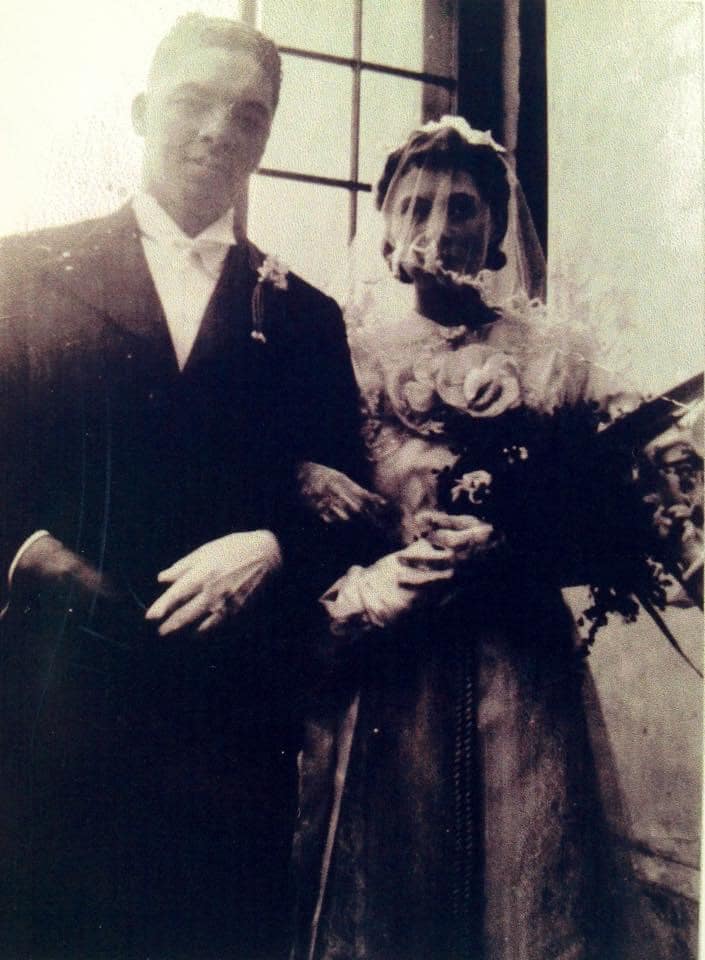
My parents were Catholics and had nine children, and followed the family tradition of running trading store in a town called Lusikisiki, which is 100 miles south of Durban.
I had a nine-year-old brother Kenny who drowned on a school excursion. The white section of the beach was generally nice and the coloured section where my brother and two other young boys drowned (due to strong rips) was not so pleasant: there was a rumour that the lifeguards were not overly helpful ... the nuns from my brother's boarding school tried to save the boys without any success.
What was also different was that the Irish side of mum's family had money, so we had tailored suits, businesses and servants, but we had to go in the side door with the Indians, Africans etcetera at the post office and use different toilets and so on, yet if you were a white derelict on the street you could walk in the front door everywhere.
It took me years to understand my father's anger and frustration, also my sisters looked fair - having Irish features - but it was a very dysfunctional system of freedom, based on colour. I was quite protected as a young child and moving to Australia at the age of six in 1969.
It was a big change trying to assimilate in an Australia which had only just ended the 'White Australia Policy', but in a way I remember my father seeing African-American soldiers on leave in Kings Cross in 1969, and surprised they could walk down the street with a white women on each arm and not get locked up - which is what would have happened in South Africa.
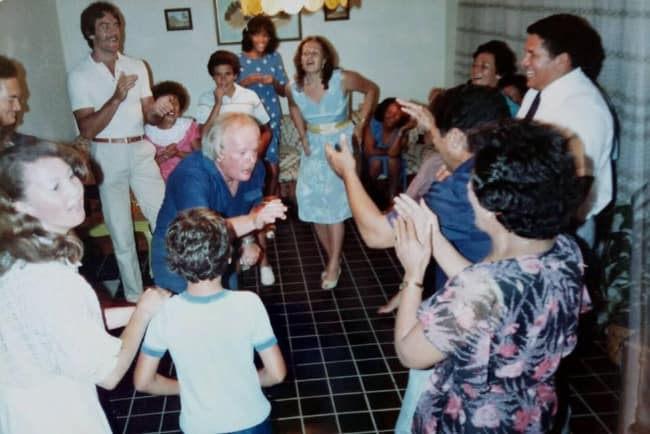 Van Rooyen family get together.
Van Rooyen family get together.
My mother buried Kenny and said she’d had enough of the politics and Apartheid and we had option of Canada or Australia to migrate to; even in old age on arrival in Australia my parents ran a milk bar in Malabar near Long Bay Jail. We lived in Kings Cross on arrival, then Paddington, then Woollahra (surprisingly in Magney Street, where the previous occupant had been (author) Patrick White; we thought it odd that Mr White, who we didn’t know, got so much mail every day).
We were living in Maroubra where my father died when I was 10, and we eventually moved to the Northern Beaches where Mum had a sister around 15, and my life had been footy and surfing and ... some slow progress learning guitar."
What were the main songs and music you recall as you grew up?
Phil Van Rooyen: "Firstly, African Xhosa music. A family favourite was 'The Click' song which was the African dialect we spoke - some of my siblings spoke Afrikaans which was part of school education.
First song I think of around the time we were leaving from Durban on the 'Oriana' was Elvis Presley doing “In The Ghetto” and “Suspicious Minds”; Rolling Stones “Honky Tonk Women”; also my family loved early Jackson 5 “ABC” era and one of my first concerts was seeing Jackson 5 supported by Hush at Hordern Pavilion. Creedence Clearwater Revival “Looking Out My Back Door”, then I kinda started buying my first albums around 13 being AC/DC's “High Voltage" and “Dirty Deeds”, along with Hush “Rough, Tough and Ready”. I don’t know if it was the glam or the novelty of a band with an Asian guitarist, but Les Gock was a big teen influence, along with Angus Young.
What made you pick up guitar? And, was that the first instrument?
Phil Van Rooyen: I picked up guitar due to my love of music, watching Countdown and seeing AC/DC at age thirteen at Daceyville Police Boys Club around age 13. My family had a big love of music and two of my brothers sang in bands in their youth, guitar was my first instrument.
My eldest brother Winston was lead singer in a band doing Stones and James Brown in the 1960s; also, my middle brother briefly sang in a band. I have a brother, Collett, who played guitar in bands on a small country town scale, (but big dances for the time) and I have a sister who was a school principal and played piano at school and home (but not in bands), so there was a love of music in my siblings, although not so much my parents.
I know some folks regard the social climate of the 1960s in Australia as some sort of promised land in reverse, but what was your take on it?
Phil Van Rooyen: My take on the social context was Australia was very white and immigrants like us got thrown in the racial mix of the Italians (“wogs”). It seemed quite racist and I spent a lot of time fighting comments and slurs even up to my teens with an Afro or dreadlocks and dark skin, be it Maroubra not so bad, but Manly was and still is very white and not so open to non-whites. Of course it started changing with our youth, thank God.
How long did it take you to walk on stage and play?
Phil Van Rooyen: When I around 16, guys from school would jam together. Included in the mix was Kent Steedman and these guys could play well. I was tutored and put on bass and rhythm guitar while learning how to play Hendrix and Birdman songs and smoking heaps of cones.
I was first on stage around 16, 17, playing in a local band, but most of my life guys like Big Al Creed and a mate Troy Duncombe (who joined the Allniters) and many others became teachers to me, vocally and by example. Andy as well, just as I continue to learn from Spencer P. Jones and lots of killer Aussie bands including Powerline Sneakers. My influences seem to be very Aussie-centric - I'm not sure why but it’s what inspires me.
Noting that the Chickenstones seem to be on hiatus ... I wonder if you could share a little about how Chickenstones formed and developed, how you met Andy...?
Phil Van Rooyen: The Chickenstones are not really on hiatus, but for a time Andy struggled to play due to arthritic hands. Big Al Creed joining to play Andy’s guitar parts at the last show was a great success. Anyhow the question how we met and formed Chickenstones. Well, after five years playing in Fruitworld then five years (roughly) in The Panadolls I had a few years rest to sort myself out after personal struggles. Andy and I have known each other a long time and regularly surfed together at Curl Curl Beach. Also, we both worked weekend shifts in drug rehabs so we would debrief down the beach as we both did weekend shifts.
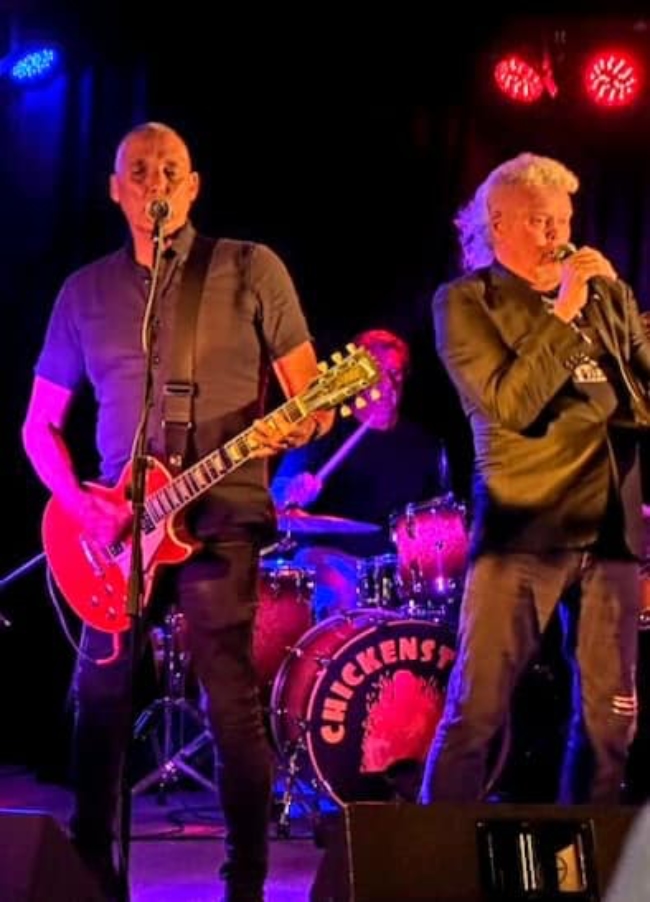 Phil and Andy.
Phil and Andy.
Andy said he had some guitars and I went over and he had played in bands around the beaches, and we started playing and ended up writing some originals together. Jim Kelly, our bass player, heard our demos and said could we get up at his 40th and do a couple of songs at Manly Skiff Club. We got a young drummer called Max Crawford and did our first short set at Jim’s birthday, then got some support shows at the Lansdowne for a mate's band, Chuck's Wagon, hence the cowboy hats and acoustic guitars.
Andy would play slide and I used an acoustic guitar which we then amplified in the beginning then - like Dylan without the controversy! - we became electrified. We have been going strong for 17years and plan to record (again) soon and do more shows. Chickenstones is an easy band to be in as Andy and Jimmy are fairly normal unlike me ... ha!
Noting your EP’s title “Jails, Death & Institutions”, and that the cover is a still from the 1987 prison film, “Ghosts of the Civil Dead”, I deduce that prison and its impact might just be the main subject matter..?"
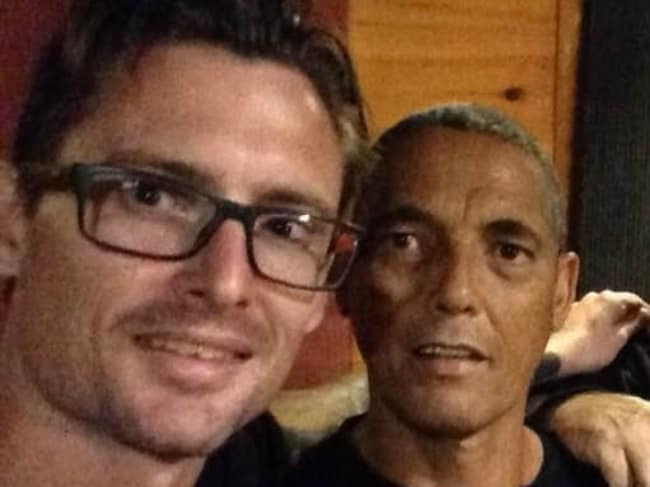 Luke and Phil.
Luke and Phil.
Phil Van Rooyen: I wrote the four songs as a response to the death of Luke Lovelock; who played guitar with me in the Circus Chaplains. Though he was Damien Lovelock’s son, was also like a son to me. Anyhow, he was three years sober, Circus Chaplains were doing great, he was working in rehab ... but he got arrested and sent to jail ...
I was devastated by the end of the band, let alone all the ramifications of him going to jail. So I came up with the songs “Jails, Death and Institutions” and “Let Me Down”, “Threw it Away”, and “Laying Next to You”. The last song, “It It Enough” is a cover of a song of Luke’s which I like so really these songs are a prequel to “Asteroid”, about Luke dying, from the Sonic Garage LP “Space Travels”.
It's a striking EP, Phil. I can understand writing the songs, but what made you put it out?
Phil Van Rooyen: I wrote these songs as well as a few others for a future Circus Chaplains album which didn’t happen after Luke’s passing. A few songs ended up on the Sonic Garage debut “Space Travels” [in 2021], and three years ago original demos for Van Ruin were put down at Big Al Creed’s Crankinhaus Studio at Ettalong . I'd always wanted Al to produce our work since being aware of his studio skills as far back as Panodolls/Fruitworld days, in these bands together and his guitar and piano and all-round talent within New Christs and his other bands.
Why did you strike out on your own?
Phil Van Rooyen: After three years of fun and drama ... I quit Sonic Garage at the beginning of 2024 just after releasing “Dark Country”. We all get along now, but five people working together is hard ... but we are still all mates. Van Ruin has ended up a collaboration - we could have called it Van Creed but I wrote the songs and you told me to call it Van Ruin and couldn’t think of another name funnily enough.
Crikey, I'd forgotten I'd suggested that. Anyway, what really gripped you about Radio Birdman, the Celibate Rifles ..? Enough to form a style which you've carried for a long time now...
Phil Van Rooyen: My family were big music lovers from African/Soul/Elvis to the Rolling Stones and I had a great music education, but “Radios Appear” and the punk explosion made getting into bands possible. Loving the Ramones and The Sex Pistols ignited something, but seeing New Christs, Powder Monkeys and getting a chance to play with great Oz Detroit bands like Asteroid B612 and too many more to name has become the genre that speaks to me, along with Rowland S. Howard and Spencer Jones.. artists that I could see playing small rooms ... they continue to inspire me to be courageous.
I sometimes think people in the middle ages had things a lot easier. People were able to be friends and say they loved each other without ghastly implications. Many men love their male friends - partly because it's a very different set of trust guidelines to their female friends. But they'd have serious difficulty accepting their feelings as love. Seems to me you saw Luke as akin to a son ...
Phil Van Rooyen: I have three daughters and Luke was part of my family as much as Damo was his Dad. During my 20 years working in rehab I had a long relationship in helping Luke get free of substances. I saw his talent - that he was unaware of - and I said '’we will have a band’, and he blossomed to the point of working in the rehab I worked in, as well as playing fill-in for the Celibate Rifles for Dave Morris, and creating great art with the singer of Coffin in his other band Dreaded East. Luke's death at 37 has continued to inspire and heal the loss I feel of losing him and the love we had."
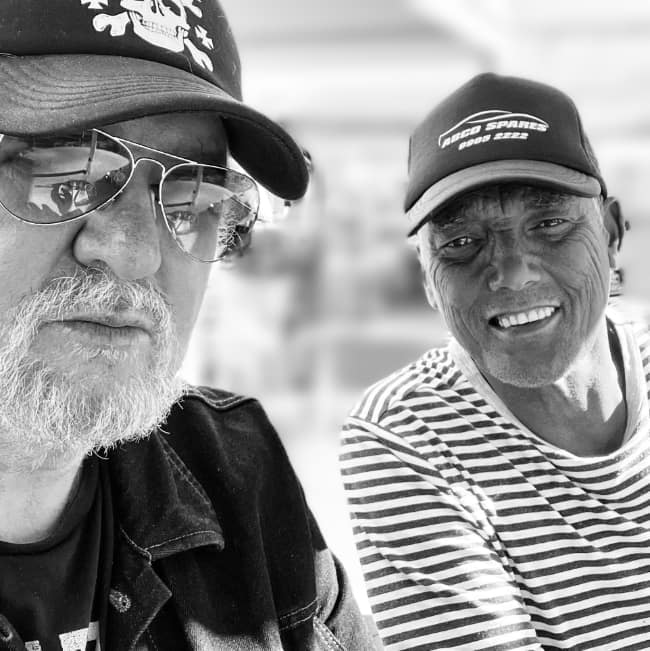 Label boss and bandmate Big Al Creed and Phil.
Label boss and bandmate Big Al Creed and Phil.
Why Al Creed? Why Stuart Wilson? Why have it mastered by Steve Carrao?
Phil Van Rooyen: Al's an amazing producer and one of the best guitarist/bass/piano musicians in the country, who continues to teach me. Hence Van Ruin being a collaboration more than a solo project. Stu Wilson and Al were both in the New Christs so it seemed logical. Stu is an amazing drummer with great skills and great vocals, as well as his input in Loose Pills, The Crisps and many others ... so why not? And Steve Carrao provided great mastering and great value for money ... and it looks good having 'mastered in Nashville' on your credits!"
So why record it now?
Phil Van Rooyen: Well, Al became available, so the universe allowed us to complete the work three years later, and he offered to release on his label Crankinhaus Records and play live, so we're getting a live set happening. We currently have 10 songs and hoping to do launch shows come in December and January and play some dirty rock n roll.
- - - - -
So “Jails, Death & Institutions” is exactly what it says on the tin, folks. Five songs, a "short, sharp collection of what already feels like Aussie rock and roll classics".
The title track opens with smooth, rippling intensity in a style so beloved of Australian rockers. The inclusion of the jabbing piano - as well as wah-wah - is a stroke of genius (as well as a nod to a certain band) and brings a bad-bar stink to the song. “Let Me Down” is a striking, tuff power ballad which - not giving anything away here - recall those by a Birdman or The Stooges. But you already knew that. And the puddin’ is in the eatin’.
Overall, you're listening to a complete story, a novella if you like, writ large, with depth, breadth and power. The production is big and tough but sexy enough for mainstream radio (who will, of course, ignore it, just like they ignore anything genuinely good, real or moving these days).
When the last song, “Is It Enough?”, dies, you don't want the EP to stop so soon, so you just put it on again. “Jails, Death & Institutions” will be with you for quite a while.
Verdiuct? Five bottles.
Van Ruin's "Jails, Death & Institutions" is out on Crankinhaus Records and is available here. Read The Barman’s full review here.

